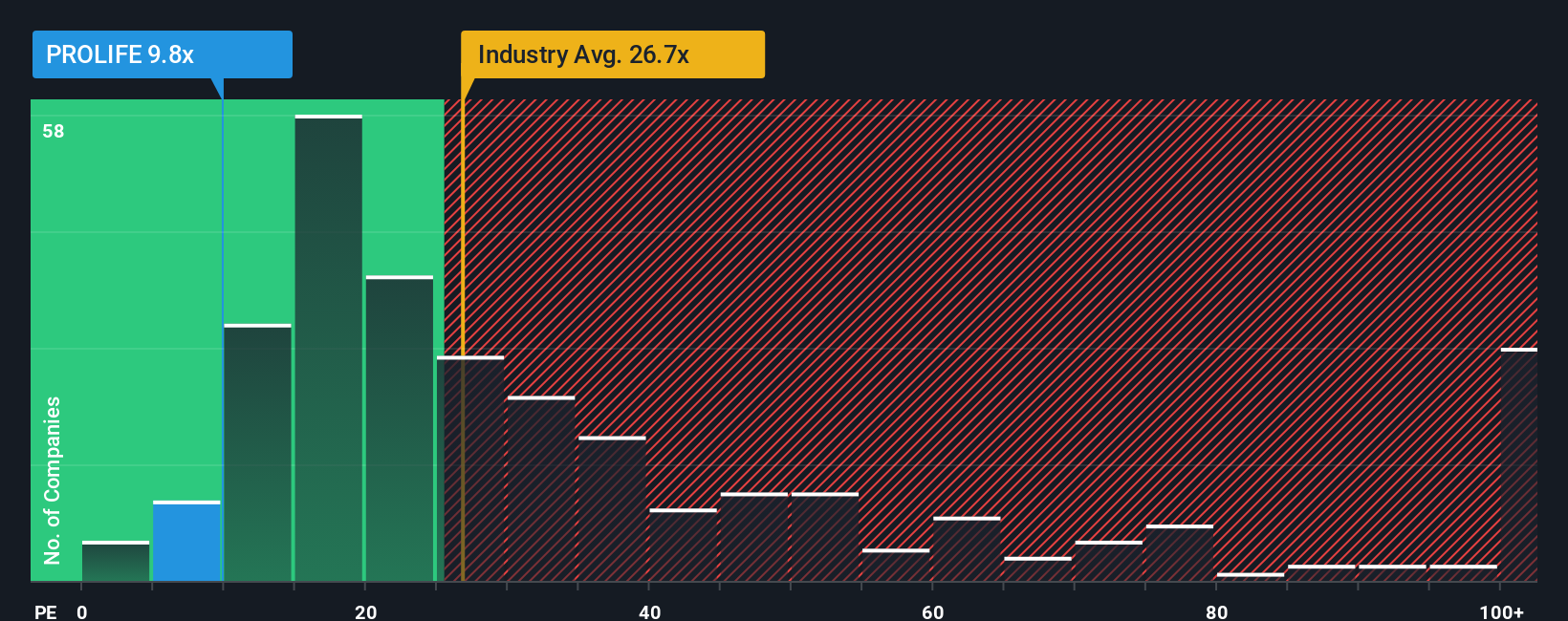Little Excitement Around Prolife Industries Limited's (NSE:PROLIFE) Earnings As Shares Take 25% Pounding
The Prolife Industries Limited (NSE:PROLIFE) share price has fared very poorly over the last month, falling by a substantial 25%. For any long-term shareholders, the last month ends a year to forget by locking in a 53% share price decline.
Following the heavy fall in price, given about half the companies in India have price-to-earnings ratios (or "P/E's") above 28x, you may consider Prolife Industries as a highly attractive investment with its 9.8x P/E ratio. Although, it's not wise to just take the P/E at face value as there may be an explanation why it's so limited.
As an illustration, earnings have deteriorated at Prolife Industries over the last year, which is not ideal at all. One possibility is that the P/E is low because investors think the company won't do enough to avoid underperforming the broader market in the near future. However, if this doesn't eventuate then existing shareholders may be feeling optimistic about the future direction of the share price.
View our latest analysis for Prolife Industries

Is There Any Growth For Prolife Industries?
The only time you'd be truly comfortable seeing a P/E as depressed as Prolife Industries' is when the company's growth is on track to lag the market decidedly.
If we review the last year of earnings, dishearteningly the company's profits fell to the tune of 47%. This has soured the latest three-year period, which nevertheless managed to deliver a decent 8.8% overall rise in EPS. Although it's been a bumpy ride, it's still fair to say the earnings growth recently has been mostly respectable for the company.
Comparing that to the market, which is predicted to deliver 25% growth in the next 12 months, the company's momentum is weaker based on recent medium-term annualised earnings results.
With this information, we can see why Prolife Industries is trading at a P/E lower than the market. It seems most investors are expecting to see the recent limited growth rates continue into the future and are only willing to pay a reduced amount for the stock.
The Key Takeaway
Shares in Prolife Industries have plummeted and its P/E is now low enough to touch the ground. Generally, our preference is to limit the use of the price-to-earnings ratio to establishing what the market thinks about the overall health of a company.
We've established that Prolife Industries maintains its low P/E on the weakness of its recent three-year growth being lower than the wider market forecast, as expected. At this stage investors feel the potential for an improvement in earnings isn't great enough to justify a higher P/E ratio. Unless the recent medium-term conditions improve, they will continue to form a barrier for the share price around these levels.
You need to take note of risks, for example - Prolife Industries has 3 warning signs (and 2 which don't sit too well with us) we think you should know about.
It's important to make sure you look for a great company, not just the first idea you come across. So take a peek at this free list of interesting companies with strong recent earnings growth (and a low P/E).
New: Manage All Your Stock Portfolios in One Place
We've created the ultimate portfolio companion for stock investors, and it's free.
• Connect an unlimited number of Portfolios and see your total in one currency
• Be alerted to new Warning Signs or Risks via email or mobile
• Track the Fair Value of your stocks
Have feedback on this article? Concerned about the content? Get in touch with us directly. Alternatively, email editorial-team (at) simplywallst.com.
This article by Simply Wall St is general in nature. We provide commentary based on historical data and analyst forecasts only using an unbiased methodology and our articles are not intended to be financial advice. It does not constitute a recommendation to buy or sell any stock, and does not take account of your objectives, or your financial situation. We aim to bring you long-term focused analysis driven by fundamental data. Note that our analysis may not factor in the latest price-sensitive company announcements or qualitative material. Simply Wall St has no position in any stocks mentioned.
About NSEI:PROLIFE
Prolife Industries
Manufactures and sells naphthalene-based intermediates for dyes, pigments, pharmaceuticals, agrochemicals, and others in India.
Excellent balance sheet with slight risk.
Market Insights
Community Narratives



